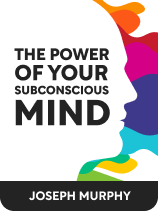

This article is an excerpt from the Shortform book guide to "The Power of Your Subconscious Mind" by Joseph Murphy. Shortform has the world's best summaries and analyses of books you should be reading.
Like this article? Sign up for a free trial here .
Is it possible to influence your subconscious mind through conscious thought? What can you do to train your subconscious mind to think more positively?
In his book The Power of Your Subconscious Mind, Joseph Murphy explains how to train your subconscious mind through conscious thought. The process to train your subconscious mind is very simple: You just need to use your conscious mind to imprint positive thoughts and images upon your subconscious mind. Murphy explains that there are two steps to making this process work for you: First, you need to decide to think positive thoughts. Then, you need to trust that your subconscious mind will create experiences that align with your positive thoughts.
In this article, we’ll explore these two steps in detail.
Step 1: Decide to Think Positive Thoughts
Murphy argues that you need to take control of what thoughts your subconscious mind identifies with by consciously deciding to get in charge of your thoughts. Recall that your conscious mind is active and your subconscious mind is passive. Even though your subconscious mind creates your life experiences, it can only follow the habitual conscious thoughts—or in other words, instructions—from your conscious mind. He suggests that you explicitly tell your subconscious mind that, from now on, you’re only going to think positive thoughts. This will give you the conviction you need to change your conscious thoughts and improve your life.
(Shortform note: Murphy’s view on how to train your subconscious mind to think and act more optimally may not be as easy as Murphy makes out. This is because your thoughts and your state of mind reinforce one another to create an internal feedback loop that’s difficult to break out of: Your thoughts determine your state of mind (thinking about problems makes you feel anxious) and your state of mind determines your thoughts (you feel anxious so you think about your problems). However, research reveals that making the effort to become more aware of your thoughts allows you to disentangle yourself from this feedback loop. Instead of feeling as if you’re stuck within an uncontrollable cycle of thoughts, your awareness allows you to view and change your thoughts objectively.)
Refuse to Let the Negative Thoughts of Others Impact You
To take control of your conscious thoughts, be careful about what thoughts and beliefs you absorb from others. According to Murphy, other people can’t influence you unless you accept their thoughts into your mind. You’re the only one in control of your conscious thoughts and you can choose what you want to believe. When you choose to entertain the thoughts of others, they become your thoughts. If you think these thoughts often enough, they imprint upon your subconscious mind and become your beliefs. Your subconscious mind then creates experiences that match these beliefs.
Murphy claims that throughout your life you’ve unconsciously absorbed unproductive and limiting beliefs from others, such as, “Old age creates suffering,” or, “Money doesn’t grow on trees.” According to Murphy, these cliches don’t lead to positive experiences. Therefore, consider the conversations you have with others as verbal expressions of your thoughts and beliefs that will ultimately either allow or block your subconscious mind’s access to Universal Consciousness. Above all, Murphy suggests that you avoid discussing problems and issues that perpetuate negative thoughts and beliefs.
| How to Let Go of the Thoughts and Beliefs You’ve Absorbed Throughout Your Life While Murphy stresses the importance of being vigilant about the thoughts you absorb from others through conversation, he doesn’t explain how the thoughts you’ve already absorbed from others impact you. According to Maxwell Maltz (Psycho-Cybernetics), throughout your childhood, you unconsciously adopted the opinions and beliefs of others. This is because, when you were young, you were less able to question what was going on around you and to form your own rational conclusions. As a result, you simply absorbed everything you heard, saw, and experienced. The more you dwelt on these thoughts, the heavier the imprint you left upon your subconscious mind. These thoughts then turned into your beliefs. Maltz argues that, while you may choose to think different thoughts now, the thoughts and beliefs you accepted as a child continue to live in your subconscious mind and inform your feelings and behaviors. Like Murphy, Maltz believes that it’s possible to replace these outdated beliefs with what you choose to believe. Like Murphy, Maltz recommends that you mind the tone of your conversations to ensure you’re not using words that reinforce your negative beliefs. In addition, he suggests that you regularly imagine yourself acting like your ideal version of yourself. In other words, choose the beliefs you want to adopt and imagine yourself as someone who already lives by these beliefs. For example, if your ideal self only thinks positive thoughts, imagine how you’d feel and behave throughout various situations in your life. How would you feel about your work, your relationships, and your social life? How would you behave in these situations? Maltz claims that, with constant practice, your subconscious mind will gradually become accustomed to accepting the thoughts and beliefs you wish to adopt. As a result, it will let go of the old, unproductive beliefs that you’ve absorbed throughout your life. |
Step 2: Trust the Process to Work for You
To explain why you need to trust the process of your subconscious mind creating positive thoughts for it to work, we’ll first explain Murphy’s beliefs about how your body heals from mental and physical injuries. Recall that your subconscious mind regulates all of your vital bodily functions—this includes the healing process. For example, it regulates the little paper cuts that heal overnight or the headache that fades away without intervention.
When you rely on intervention to heal yourself, such as surgery, psychology, or spiritual help (you pray for your healing), you assume that an outside source has healed you: “I am healed now because of that doctor or that religion.” However, Murphy argues that this is not the case—your subconscious mind is always in control of your healing process, and it is your faith in the healer (your method, doctor, or religion) that heals you, not the healer itself. Your conscious faith that the process will work imprints upon your subconscious mind and instructs it to heal you.
This faith isn’t restricted to the healing process but applies to all areas of your life, from your relationships to your general success. Your subconscious mind operates according to your beliefs and expectations. Therefore, Murphy concludes that you must trust that your positive thoughts will create positive experiences for you if you want the process to work.
| Your Expectations Shape Your Life Experiences In this section, Murphy argues that having faith that something will happen—that you’ll be healed from an illness, or that thinking positively will lead to positive experiences—is crucial in making this thing actually happen. This concept is similar to the well-known placebo effect: the idea that people can actually heal from an illness simply if they believe or have faith that they’ve been treated with medicine, even if the “medicine” is actually fake. Therefore, to further explore Murphy’s argument, we’ll look at recent research studies that examine the impact of positive expectations and the placebo effect. Dan Ariely (Predictably Irrational) explains that the placebo effect demonstrates how all of your experiences are shaped by the expectations you have going into them. According to Ariely, this phenomenon operates on two mechanisms: faith and conditioning. Faith: If you have faith in the drug or the procedure, it’s more likely to make you feel better. Conditioning: Your body naturally releases chemicals in expectation of what’s to come. If you have faith in your treatment, you feel more confident and you expect to get better. This prompts your body to produce chemicals that do make you feel better. For example, when you have a headache and you decide to take some painkillers, your body expects to feel relief and starts releasing opiates and endorphins before you even put the tablet in your mouth. Ariely argues that the placebo effect plays out in all areas of your life because your expectations heavily influence your perception of events. For example, if you walk into a dark alley expecting to come across danger, you experience a heightened awareness of danger. As a result, your heart rate increases and you notice every slight sound and flicker of movement. On the other hand, if you walk into this alley feeling relaxed and confident, your physiology remains the same and you’re not as alert to your surroundings. Since your expectations alter your perceptions, they also alter the outcome of your experiences because your behavior is a result of how you respond to your perceptions. Therefore, if you have positive expectations about Murphy’s methods—you believe that practicing his methods and thinking positive thoughts will improve your life experiences—your perceptions will reflect this. You’ll find yourself paying more attention to what’s working and improving in your life, and this awareness will lead you to shift your behavior and open you up to new experiences. On the other hand, if you approach Murphy’s methods with low expectations, your perceptions will remain the same, and you won’t feel the impetus to change any of your behaviors. |

———End of Preview———
Like what you just read? Read the rest of the world's best book summary and analysis of Joseph Murphy's "The Power of Your Subconscious Mind" at Shortform .
Here's what you'll find in our full The Power of Your Subconscious Mind summary :
- How your subconscious mind creates your life experiences
- How to improve your life experiences by using your conscious mind to influence your subconscious
- Why we're all designed to experience happiness






